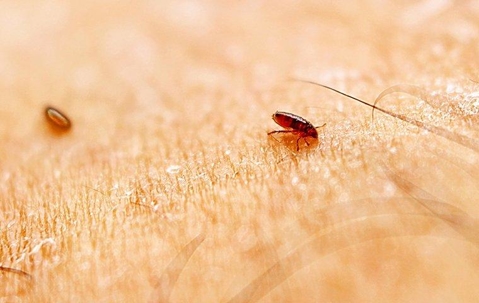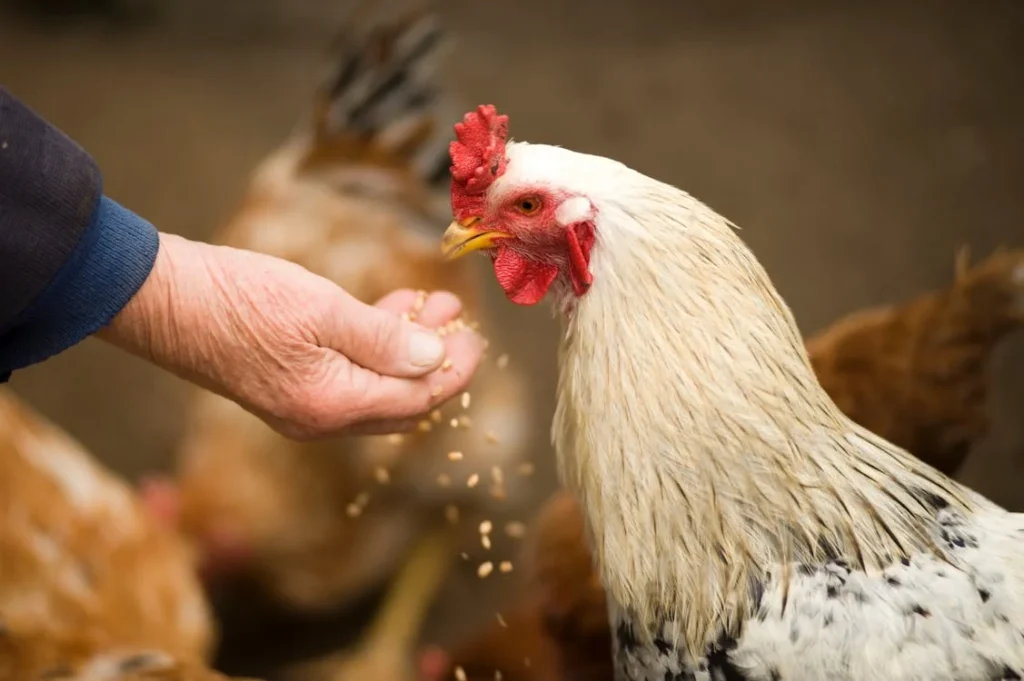If you’ve ever witnessed your chickens pecking furiously at the ground, you might wonder if they’re indulging in a bizarre new snack – fleas. The answer is yes and no. Chickens do have a natural instinct to peck at anything that moves, including fleas. However, whether they actively seek out fleas as a regular source of food and the potential benefits and drawbacks of this behavior require a closer look.
The Benefits Of Chickens Eating Fleas
While not a primary food source, there can be some advantages to chickens consuming fleas:
- Natural Pest Control: Chickens can act as living flea traps, helping to reduce flea populations around your coop and yard. Their constant foraging and keen eyesight make them efficient at spotting and snatching these tiny pests.
- Dietary Boost (Maybe): Fleas contain a small amount of protein and some essential vitamins. While not a significant source of these nutrients, occasional flea consumption might offer a minor dietary boost to your chickens.
- Improved Morale: A flea infestation can be a real nuisance for chickens, causing irritation and restlessness. By keeping the flea population in check, chickens can experience a calmer and less stressful environment.
Things To Watch Out For When Chickens Eat Fleas
Here are some potential downsides to consider when it comes to chickens consuming fleas:
- Flea Infestation Woes: While chickens can help control fleas, a heavy infestation can overwhelm even the most enthusiastic flock. In such cases, it’s crucial to implement additional flea control measures to protect your chickens’ health and well-being.
- Parasite Problems: Fleas can carry parasites like tapeworms, which can be transmitted to chickens if ingested. Regularly deworming your chickens is essential to prevent parasite-related health issues.
- Disease Transmission: Fleas can potentially transmit diseases between animals. While the risk is relatively low for healthy chickens, it’s something to keep in mind, especially if there are wild animals like rodents or stray cats roaming around your coop.
- Nutritional Imbalance: Fleas shouldn’t be considered a significant source of nutrients for chickens. Relying solely on flea consumption for protein or vitamins can lead to malnutrition. A balanced diet remains paramount.
- Chemical Concerns: If you’re using flea control products on your pets or in your yard, ensure they’re safe for chickens. Some flea medications can be toxic to poultry.

How Often Should You Feed Your Chicken Fleas?
Chickens shouldn’t be viewed as a flea-control solution. Their natural foraging behavior might lead them to consume some fleas, but it’s not something to actively encourage. Focus on creating a healthy environment with proper coop hygiene and consider natural flea control methods like diatomaceous earth or beneficial nematodes.
Its best to prioritize flea prevention strategies like:
- Regular Cleaning: Maintain a clean coop by removing droppings and debris frequently. This reduces flea breeding grounds.
- Bedding Management: Use fresh, clean bedding materials like wood shavings or chopped straw. Replace the bedding regularly to prevent flea larvae from developing.
- Dust Baths: Provide your chickens with a dust bath area. Chickens love to dust themselves, and this helps remove fleas and mites from their feathers. You can use a mixture of sand, dirt, and wood ash for the dust bath.
- Natural Flea Repellents: Explore natural flea repellents like dried herbs (lavender, rosemary) or citrus peels scattered around the coop. While the effectiveness might vary, these options can offer some additional deterrence.
Can Baby Chicks Eat Fleas?
No, baby chicks shouldn’t be exposed to fleas at all. Their immature digestive systems are highly sensitive, and any potential parasites carried by fleas could pose a serious health risk. Focus on providing baby chicks with a clean environment and a balanced chick starter feed to meet their specific nutritional needs.
What Other Foods Can Chickens Eat?
Chickens are omnivores, meaning they enjoy a variety of foods alongside their regular feed. Here are some healthy and safe options to complement their diet:
- Fruits and Vegetables: Offer chopped fruits and vegetables in moderation. Good choices include apples (minus the core and seeds), blueberries, raspberries, strawberries, leafy greens like kale and romaine lettuce (in small quantities), grated carrots, sweet potatoes (cooked), and chopped broccoli florets.
- Kitchen Scraps: Share some kitchen scraps with your chickens, but be mindful of what you offer. Cooked, unseasoned vegetables like peas, corn, and chopped tomatoes are generally safe. Avoid scraps that are greasy, salty, or spoiled.
- Mealworms and Crickets: These insects are a great source of protein for chickens and can be offered as an occasional treat. You can purchase dried mealworms or crickets from pet stores or online retailers.
- Herbs: Fresh herbs like basil, oregano, mint, and thyme can add some variety and beneficial nutrients to your chicken’s diet. However, introduce them slowly and in small quantities, as strong flavors might overwhelm their senses.

How To Give Your Chicken A Healthy And Balanced Diet
The foundation of a healthy chicken diet should be a good quality, commercially prepared chicken feed formulated for their age and laying status (layer feed for egg-laying hens). This feed will provide all the essential nutrients your chickens need to thrive. Here are some additional tips for creating a balanced diet:
- Fresh Water is Key: Ensure your chickens have access to clean, fresh water at all times. Water is crucial for proper digestion, egg production, and overall health.
- Provide Grit: Grit (small pebbles or crushed rock) aids digestion in chickens by helping them grind up their food. You can purchase grit from farm supply stores or mix it into their feed.
- Offer Variety (In Moderation): While a balanced feed is essential, supplementing with small amounts of fruits, vegetables, and other treats can enrich your chicken’s diet and provide them with mental stimulation while they forage.
- Observe Their Eating Habits: Pay attention to how much your chickens are eating and adjust their feed portions accordingly. Overfeeding can lead to obesity and other health problems.
Final Verdict
Chickens will naturally peck at fleas if they encounter them while foraging. While there might be some minor benefits like a protein boost and reduced flea population, it shouldn’t be encouraged as a primary food source. Instead, prioritize a clean coop environment, natural flea control methods, and a balanced diet formulated for chickens to keep your feathered friends healthy and happy. Remember, a well-fed and healthy chicken is more resistant to pests and parasites in the long run.
If you notice a significant flea infestation in your coop, consult a veterinarian or poultry specialist for advice on safe and effective flea control measures to protect your chickens.

